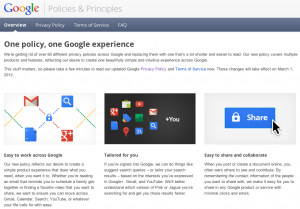As of March 1, 2012, Google will be replacing its 60+ privacy policies with one. In an effort to try and simplify terms for users to better understand, all the Google services’ policies will be combined into one. Google’s new, shorter privacy policy will allow them to share users data across their applications (YouTube, Gmail, etc).
Google users are still able to control their personal information, can edit ad preferences and can also control whom their information is shared with. Google has been collecting user data for some time now, that aspect isn’t new. When you sign up for a Google account, Google asks for personal information, such as your name, email address and phone number. From there, they give you an option for whether or not to create a public profile and upload a photo of yourself.
Some other information Google will collect is:
- Device information: what device you’re using, which operating system and what mobile network
- Log information: Search queries, phone numbers, phone calls, internet protocol addresses, system activity, which browser you’re using and more
- Location information
- Unique application numbers
- Local storage
- Cookies
What Google is trying to do is treat a single user as a single user across all of their products, in the hopes of creating a “more intuitive Google experience.” In other words, Google would like to sell more targeted ads. By collecting your search data and YouTube views, Google can display more relevant ads to you in your Gmail or Google searches. Have you ever been reading your Gmail and wondered why a relevant ad appears at the top or side of your screen? For example, I “pinned” a tasty pasta recipe on my Pinterest recipe board and a friend of mine repined it. When I opened the email notification, to the right of my screen were links to pasta recipes. Coincidence? Not quite.
Google has been receiving quite a bit of backlash from their recent changes. Too many people jumped at the opportunity to slam Google before realizing that they’ve been allowing Google to collect and share their information for years. So what does this really mean to you?
- Your searches will become more relevant and refined
- Your information will be shared across Google platforms
- Your personal information remains personal
- Privacy remains the same
All in all, no one is forcing anyone to use Google, but because they are who they are, it’s hard to replace the options and features they offer. Remember, your privacy protection hasn’t changed and Google won’t sell your personal information without your permission (unless for legal reasons). As of March 1st, the new Privacy Policy and Google Terms of Service will come into effect.

